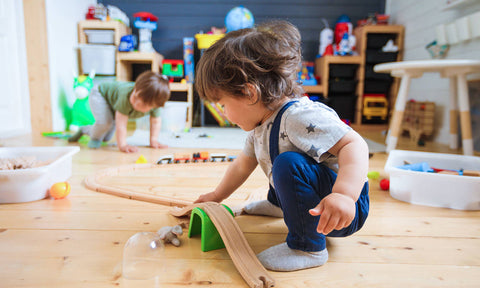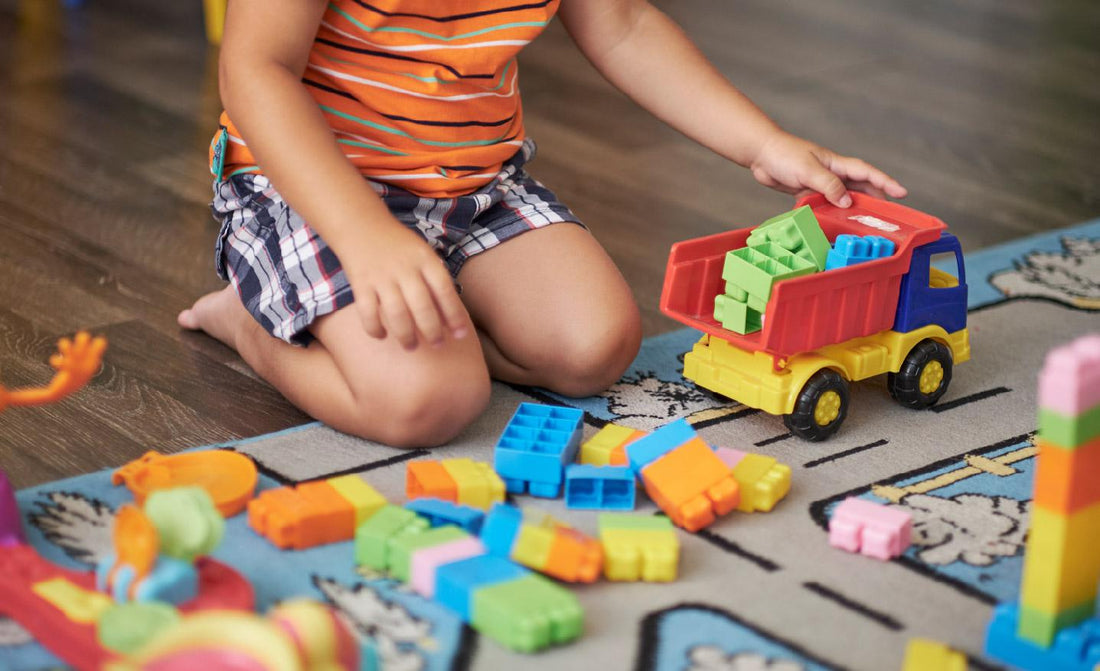Children and toys have a special relationship that is vital to their development and overall well-being.
Here are some important aspects of the connection between kids and toys:

-
Play and Learning:
Toys provide children with opportunities for play, which is crucial for their cognitive, social, and emotional development. Children learn about the world through play, develop problem-solving skills, practice creativity and imagination, and enhance their language and communication abilities.
-
Skill Development:
Toys contribute to the development of various skills in children. For example, building blocks toys and puzzles promote fine motor skills, coordination, and spatial awareness, while art supplies foster creativity and self-expression. Educational toys specifically designed for skill development can enhance areas such as math, science, reading, and critical thinking.
-
Exploration and Curiosity:
Toys encourage children to explore, discover, and satisfy their natural curiosity. They provide a safe and controlled environment for children to investigate new ideas, test theories, and learn about cause-and-effect relationships.
-
Social Interaction:
Toys can facilitate social interaction and help children develop important social skills. Children learn to take turns, share, negotiate, and collaborate when playing with others. Pretend play and role-playing toys also promote empathy, cooperation, and understanding of others' perspectives.
-
Emotional Expression and Regulation:
Certain toys, such as stuffed animals or felt dolls, can serve as comfort objects for children, offering emotional support and helping them express and regulate their feelings. Pretend play with toys allows children to act out and process their emotions in a safe and imaginative way.
-
Entertainment and Relaxation:
Toys provide entertainment and relaxation for children. Playing with toys can be a source of joy, amusement, and stress relief. It allows children to engage in activities they enjoy, helping them unwind and recharge.
-
Cultural and Identity Development:
Toys can reflect different cultures, traditions, and identities. They can help children develop an understanding and appreciation for diversity. Additionally, toys that represent different professions, hobbies, or backgrounds can influence children's aspirations and shape their sense of self.
It is important to provide children with a variety of age-appropriate toys that cater to their interests and developmental stages. Safe, engaging, and stimulating toys play a crucial role in supporting children's growth, fostering their imagination, and encouraging their holistic development.
Importance of Toys in Childhood

Toys are elements that kids use for entertainment as well as educational purposes. Children learn tremendously through interaction with the right toys. These toys offer hands-on learning possibilities that instill various basic skills in them, benefiting them in several parameters for the rest of their lives.
Let’s delve deep to understand individual aspects, apart from the generalised ones stated above, of what kids can learn through the right toys. Here are several reasons stating the importance of toys in early childhood:
-
Sensorimotor Development:
Toys stimulate a child's senses, promoting their sensorimotor development. They engage their senses of sight, sound, touch, and sometimes taste and smell, helping them explore and make sense of the world around them.
-
Cognitive Development:
Toys facilitate cognitive development by encouraging problem-solving, critical thinking, and creativity. They promote cognitive skills such as shape recognition, colour identification, spatial reasoning, and logical thinking.
-
Language Development:
Toys that incorporate language, such as books, wooden puzzles, and interactive toys, can enhance language development. They encourage vocabulary expansion, speech development, and communication skills as children engage in imaginative play and interact with others.
-
Fine and Gross Motor Skills:
Toys that involve manipulation, stacking, grasping, or physical movement contribute to the development of fine and gross motor skills. Playing with toys helps children develop hand-eye coordination, dexterity, balance, and overall physical coordination.
-
Social and Emotional Development:
Toys provide opportunities for social interaction and role-play, fostering social skills, empathy, and emotional expression. Through pretend play, children learn to take on different roles, negotiate, cooperate, and express their feelings.
-
Imagination and Creativity:
Toys stimulate children's imagination and encourage creative thinking. They allow children to create their own stories, scenarios, and worlds, fostering imaginative play and problem-solving.
-
Emotional Comfort and Security:
Toys often become companions and sources of comfort for young children, providing emotional support and a sense of security. They can be a source of familiarity, especially during times of stress or transition.
-
Cultural and Social Learning:
Toys can introduce children to different cultures, traditions, and experiences. They can help broaden their understanding of the world and encourage inclusivity and diversity.
-
Parent-Child Bonding:
Playing with toys together creates opportunities for parents or guardians to bond with their children. It strengthens the parent-child relationship and provides a nurturing and supportive environment for early development.
Conclusion:
Overall, toys are important tools for learning, exploration, and development during early childhood. They stimulate various aspects of a child's growth and provide a fun and engaging way for children to learn and make sense of the world around them. At Picked by Papa online toy store in Singapore, parents can expect a curated selection of non-toxic toys, games, and playthings that have been carefully chosen to promote learning, creativity, and enjoyment for children of various ages. We focus on providing toys that are safe, educational, and engaging to ensure a positive and enriching playtime experience for kids. Check our website for more information.
Also read – https://pickedbypapa.org/blogs/stories/how-to-find-the-right-educational-toy-for-your-child

